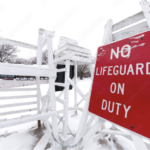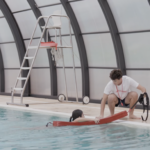Lifeguard training is an essential aspect of water safety. Illinois is a state with numerous water bodies, including beaches, lakes, and swimming pools. Therefore, it is imperative to have trained and certified lifeguards to ensure safety for all users.
This article will highlight the benefits of lifeguard classes in Illinois.
Increased safety in water bodies
The primary benefit of lifeguard training is to promote safety in water bodies. Illinois has a high number of water-related accidents, which can be prevented with trained lifeguards. Lifeguard training equips individuals with the necessary skills to recognize and respond to emergencies, including drowning and spinal injuries.
Additionally, trained lifeguards have knowledge on the use of rescue equipment such as rescue tubes, backboards, and Automated External Defibrillators (AEDs). With lifeguards on duty, swimmers and other water users can have peace of mind knowing that there is a trained professional who can act in case of an emergency.
Employment opportunities
Lifeguard training can also be a pathway to employment opportunities. With the high number of water bodies in Illinois, there is always a demand for trained lifeguards. Lifeguarding jobs can be found in swimming pools, water parks, beaches, and other aquatic facilities.
In addition, being a certified lifeguard can also open up opportunities for other jobs, such as swim instructors or pool managers. Therefore, by undergoing lifeguard courses, individuals can increase their chances of getting a job in the aquatic industry.
Improved physical fitness
Lifeguard training involves various physical activities that can help individuals improve their physical fitness. The training includes swimming, running, and strength training exercises. These exercises help to improve cardiovascular endurance, strength, and flexibility.
Additionally, it can help individuals maintain a healthy weight and reduce the risk of lifestyle diseases such as obesity and diabetes.
Enhanced teamwork skills
Lifeguard training emphasizes teamwork and collaboration. During the training, individuals learn how to work together in a team to respond to emergencies and ensure safety in water bodies. These skills are transferable to other areas of life, such as school, work, and social settings. Therefore, by undergoing lifeguard classes, individuals can improve their teamwork skills, which can help them succeed in various areas of life.
Improved communication skills
Lifeguard course also enhances communication skills. During the training, individuals learn how to communicate effectively with other lifeguards and water users. Effective communication is crucial in preventing emergencies and responding to them promptly.
Additionally, effective communication can help to de-escalate tense situations and prevent conflicts. Therefore, by undergoing lifeguard classes, individuals can improve their communication skills, which can help them in various aspects of life.
Increased confidence
Lifeguard training can also increase an individual’s confidence. The training equips individuals with the skills and knowledge necessary to respond to emergencies effectively. Additionally, the physical training involved in lifeguard training can help individuals feel more confident about their physical abilities. Therefore, by undergoing lifeguard classes, individuals can boost their confidence, which can help them succeed in various aspects of life.
Risk management and liability reduction
Lifeguard training provides individuals with risk management and liability reduction skills. Trained lifeguards are taught to identify potential hazards and implement preventative measures to reduce the risk of accidents or injuries in the water. This can include monitoring the pool environment, such as chemical levels and signage, and enforcing safety rules and regulations.
Lifeguard training also covers legal and ethical considerations in aquatic settings, helping lifeguards understand their legal responsibilities and potential liabilities. This knowledge and experience can be valuable in a range of careers, including those in the legal or insurance industries.
Personal and professional growth
Going through lifeguard classes provides opportunities for personal and professional growth. By undergoing the training, individuals can challenge themselves physically and mentally, while also developing valuable interpersonal and leadership skills. These skills can be transferred to other areas of life, such as school, work, or personal relationships.
Additionally, lifeguarding can be a rewarding career, providing opportunities to work in a dynamic and fulfilling environment, help others, and make a positive impact on their communities.
Emergency response training
Lifeguard training involves extensive emergency response training that can be applied in other areas of life. This includes first aid and CPR training, which can be valuable skills to have in any setting. In addition, it covers emergency response procedures and techniques, including search and rescue and spinal injury management.
These skills can be valuable in other emergency situations, such as natural disasters or accidents. By undergoing lifeguard training, individuals can gain the skills and confidence to respond effectively in a range of emergency situations.
Enhanced teamwork and communication skills
Lifeguarding is a team-oriented profession that requires effective communication and collaboration. Lifeguard training provides individuals with opportunities to develop and enhance their teamwork and communication skills. Lifeguards must be able to communicate effectively with each other, as well as with other staff members and patrons.
They must also be able to work together as a team to respond to emergencies and maintain safety in the pool environment. These skills are transferable to other areas of life, such as the workplace, school, and personal relationships. By undergoing lifeguard classes, individuals can develop and enhance their teamwork and communication skills, which can benefit them in a range of contexts.
Job opportunities
Lifeguard training can lead to a variety of job opportunities. With summer camps, community pools, water parks, and beaches in need of trained lifeguards, there is a high demand for individuals who have undergone lifeguard courses. Many organizations, such as parks and recreation departments or private companies, require lifeguard certification for employment.
Additionally, lifeguarding can be a great way to earn money during the summer months or while attending college. By completing lifeguard certification program, individuals can gain the skills and certification necessary to access these job opportunities and build their resumes.
Conclusion
Lifeguard training is essential for promoting safety in water bodies. The benefits of this lifeguard training in Illinois include increased safety in water bodies, employment opportunities, improved physical fitness, enhanced teamwork and communication skills, and increased confidence. Therefore, individuals who are interested in becoming certified lifeguards can enroll in a training program to gain the necessary skills and knowledge.
The American Lifeguard Association is one organization that offers lifeguard certification programs in Illinois. By choosing to undergo lifeguard training, individuals can make a positive impact on the safety of water users and open up opportunities for personal and professional growth.
The American Lifeguard Association has been listed over the years with the CDC Healthy Swimming website. In addition, the U.S. Department of Labor and the U.S. General Service Administration (GSA) has determined that the American Lifeguard Association offers lifeguard certification programs similar to those provided by the American Red Cross. Since the early 1990s, we have helped ensure that all our training programs meet Occupational Safety and Health Administration requirements.
Under the Fair Labor Standards Act, the U.S. Department of Labor the federal Authority having jurisdiction (AHJ) has determined that the American Lifeguard Association meets the national standards for lifeguard training and certification. The American Lifeguard Association is one of a handful of national training entities listed by the United States Government to meet these federal requirements. As a result of this, the American Lifeguard Association meets the national requirements for lifeguard training and certification in all 50 states and District of Columbia and U.S. territories.







